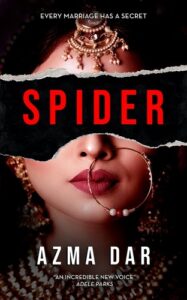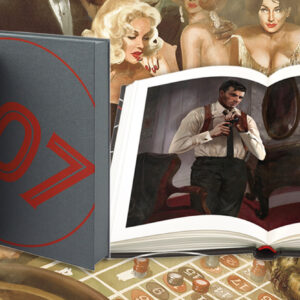Marriage has always been a theme in literature, but there’s been a rise, in the last few years, of thrillers centered on disturbing and toxic relationships between husbands and wives, domesticity infused with lies, betrayal and murder.
In my new novel, Spider, the main character, Sophie, an aspiring actress, has been married three times, and now Tariq, her most recent husband, has gone missing, having vanished on his way to work one morning. As heartbroken Sophie tries to uncover the mystery of what’s happened to him, the narrative switches between past and present, and is told from the perspectives of Sophie and each of her three husbands.
There’s her childhood sweetheart, Amir, the college heartthrob she fell madly in love with when she was still a teenager. Then there’s Faraz, the kindly foreign student she found on a Muslim matchmaking website. And finally Tariq, the handsome, intellectual widower, who fulfilled all her dreams of a perfect partner until he tragically disappeared without trace.
I wanted to play with the idea of the same story being told in different voices, all of them unreliable narrators. Who’s lying and who can we trust? Was one of the ex-husbands involved in Tariq’s disappearance? Sophie’s also cast in a different light as the various viewpoints begin to reveal hidden layers to her character and her secrets come to the surface.
Why do we enjoy reading books about less than perfect marriages? Perhaps because the enclosed, claustrophobic element of the relationship, when it’s an unhealthy one, brings with it an aura of entrapment, emotional and possibly even physical, naturally bringing a scary, menacingly real edge to the story. The comforting environment of the home automatically transforms into a prison like space, increasing the danger, and making escape, should it become necessary, even more risky and difficult.
Marriages or long term partnerships are also relatable to most of us. Although we might even guiltily recognise some aspects of what’s depicted, for the most part we can enjoy, maybe with a bit of smugness, people behaving badly in familiar circumstances, safely telling ourselves we, of course, would never do such terrible things.
Here are five deliciously dark novels that explore the sinister side of marriage…
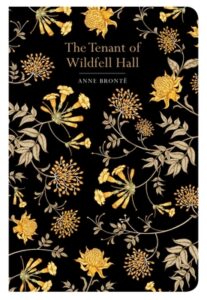
The Tenant of Wildfell Hall by Anne Bronte
Although widely regarded as a feminist drama, I think The Tenant of Wildfell also has a thriller-ish quality to it, and is probably my favourite Bronte novel. Charlotte Bronte disliked the book because of its radical subject matter and prevented its republication until 1854. When a mysterious and beautiful young woman moves into Wildfell Hall, Gilbert Markham is intrigued by her and decides to find out her secret. Told through a series of letters and diary entries, it’s a powerful, shocking, and in some ways, quite modern story of an oppressive marriage.
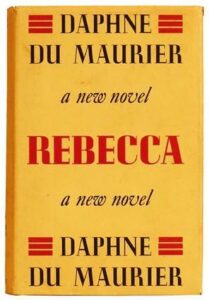
Rebecca by Daphne du Maurier
A young working class girl, travelling as a paid companion to a posh lady is swept off her feet by an attractive and wealthy widower, and very soon becomes the second Mrs de Winter. (We are never told her first name). However, the fairy tale darkens when she arrives at his ancestral home, Manderley, a mansion that’s haunted by the memory of her predecessor, Rebecca, and she finds herself fighting off shadows from the past. Her husband’s friends and family are constantly making comparisons and she becomes paranoid and full of self-doubt. The Hitchcock film adaptation is just as atmospheric and compelling as the book, and I love Judith Anderson’s portrayal of Rebecca’s old maid, the wonderfully creepy Mrs Danvers.
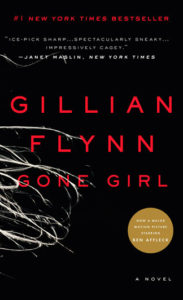
Gone Girl by Gillian Flynn
Nick and Amy Dunne are writers- he’s a journalist and she writes quizzes for magazines. They’ve left their glamorous, happy New York life and moved to the suburbs to look after Nick’s dying mother. The story begins on their fifth wedding anniversary, as Nick comes home to find his wife missing. When traces of blood are found in their living room, and Nick’s behaviour becomes increasingly evasive, it isn’t long before he becomes a suspect himself. Amy’s left Twisty, addictive and brilliantly written, it alternates between Nick’s narration and Amy’s diary entries, both of which can’t really be trusted, and is a sharp, witty observation of a troubled marriage that caused a sensation when it was published.

The Silent Wife by A S A Harrison
Todd and Jodie are a wealthy, successful couple who’ve been together for twenty years. He has a building business and she is a therapist, and they live in a beautiful waterfront house. But we learn early on that not everything is at seems. Todd is a cheat and Jodie, who is aware of this but is in denial, will soon be a killer. Although it works at a sort of cooler pace than Gone Girl—perhaps reflecting the “silent” nature of its protagonist—we’re just as gripped, as we move towards the moment Jodie becomes embroiled in murder.
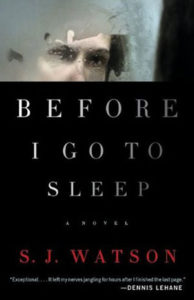
Before I Go to Sleep by S J Watson
In this ingeniously constructed novel, Christine has a form of amnesia that means she can only store memories for twenty four hours. Every morning she wakes up “in an unfamiliar bed with an unfamiliar man”—her husband, Ben, with no sense of who she is and what’s happened in her life. Every day Ben tells her that her condition was caused by a car crash decades ago, only for her to forget this information again when she goes to sleep. But she has a secret journal, to which she is directed to on a daily basis by Dr Nash, a psychologist helping her with seemingly impossible task, of reconstructing and solving the puzzle of her past.
***


